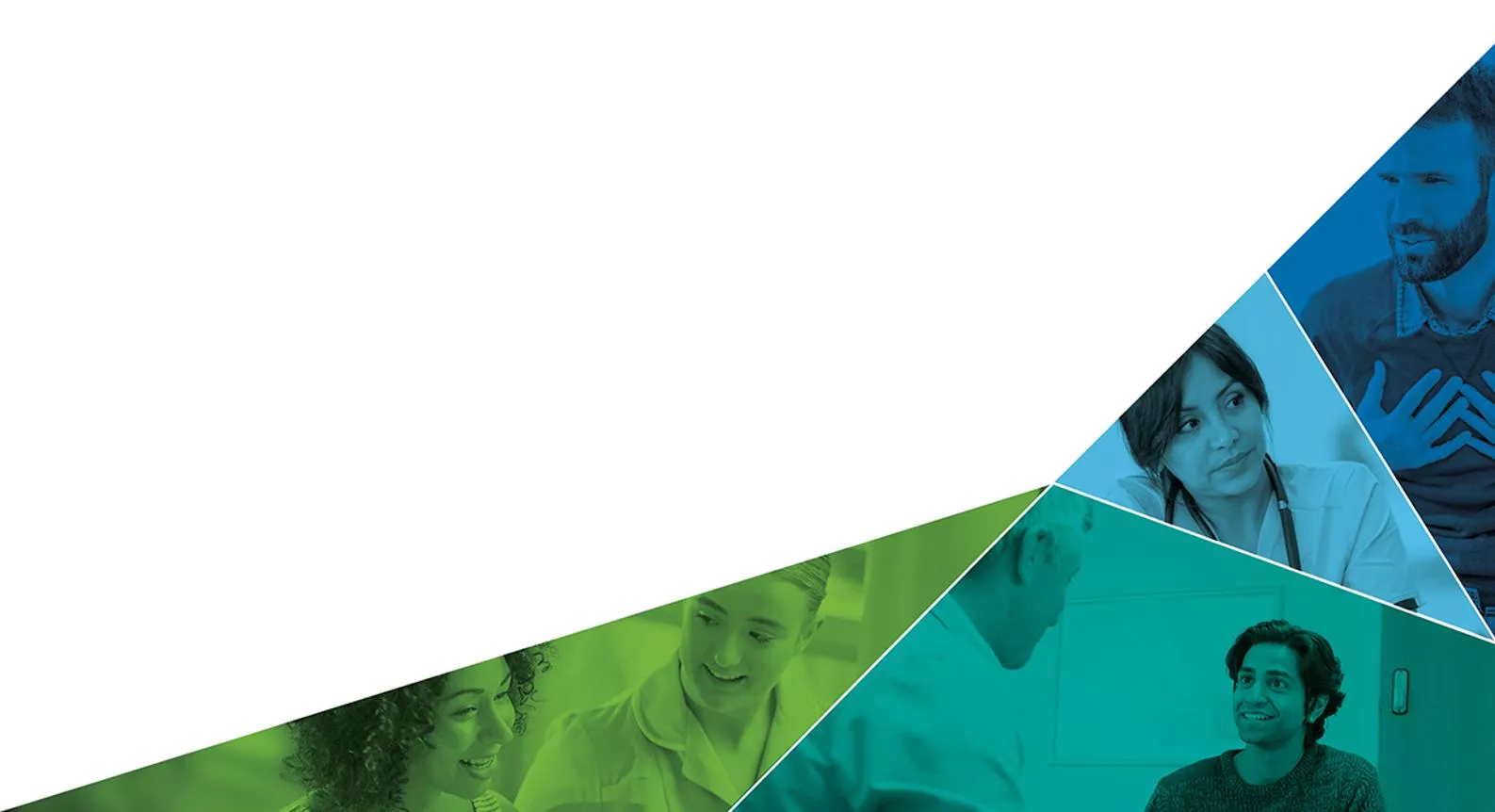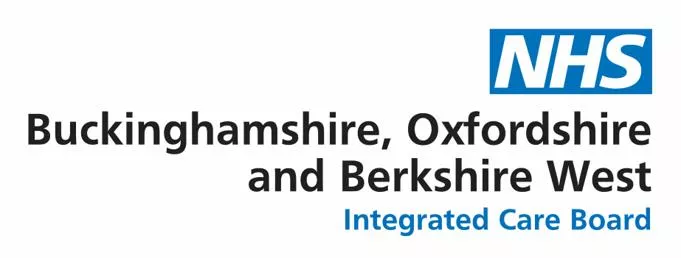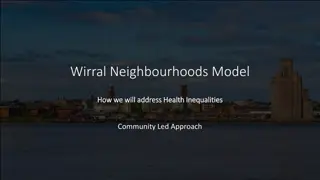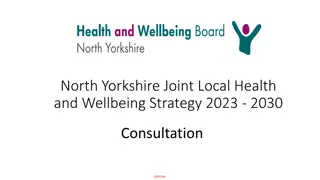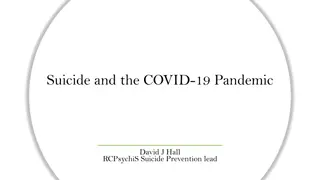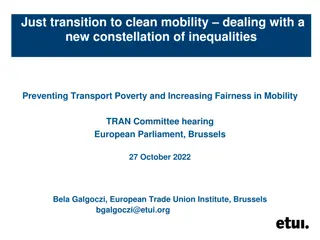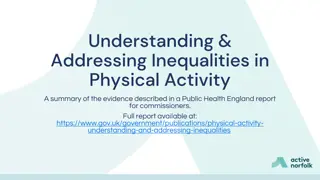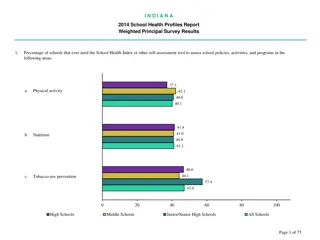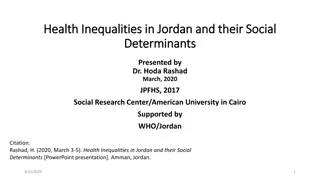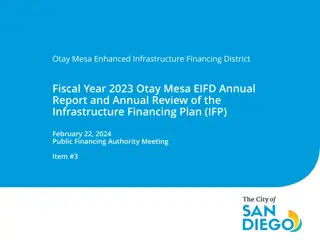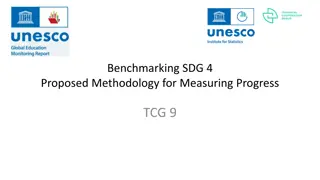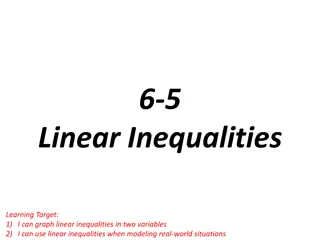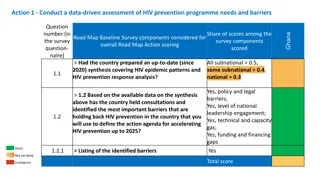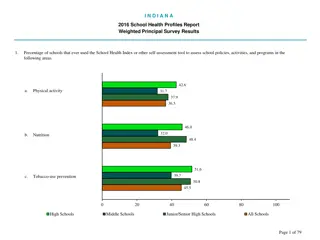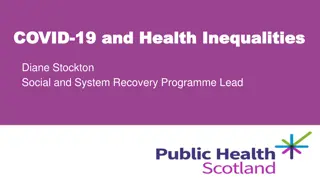Progress in Prevention and Health Inequalities - Annual Report 2023-24
The Prevention and Health Inequalities Team at BOB ICB is dedicated to enhancing prevention efforts and reducing health inequalities across their population and communities. Key achievements include setting up inpatient and maternity tobacco dependency treatment services, establishing prevention networks, and utilizing funding for locally tailored projects. The team's work focuses on primary and secondary prevention activities to keep people healthier for longer. Activities on drugs and alcohol prevention, weight management, and physical activity are part of the comprehensive approach to address health disparities.
Download Presentation

Please find below an Image/Link to download the presentation.
The content on the website is provided AS IS for your information and personal use only. It may not be sold, licensed, or shared on other websites without obtaining consent from the author. Download presentation by click this link. If you encounter any issues during the download, it is possible that the publisher has removed the file from their server.
E N D
Presentation Transcript
Prevention and Health Inequalities Team Annual Report 2023-24
Executive Summary BOB ICB (Buckinghamshire, Oxfordshire and Berkshire West Integrated Care Board) is committed to increasing our focus of preventing, and not just treating, ill-health. We are also committed to reducing inequality of access, experience and outcomes across our population and communities. The new Prevention and Health Inequalities Team, which became complete in October 2023, have made considerable progress in a short amount of time. Key achievements include: Getting inpatient and maternity tobacco dependency treatment services set up across all our trusts, with 5 out of 8 being fully established. New prevention networks set up across the priority areas of drugs and alcohol, weight management and physical activity. New and improved governance arrangements to oversee the prevention and health inequalities agenda at a system and place level. A continued focus on population health management as an essential approach to tackling health inequalities. 4million in Prevention and Health Inequalities Funding utilised by Places for locally developed schemes to meet local needs, including: Alignment of Buckinghamshire schemes with the pre-existing Opportunity Bucks programme which focuses on the 10 most deprived wards in the area. Projects span the priority areas of Starting Well, Living Well and Ageing Well. A suite of grassroots-led projects in Oxfordshire which enables investment in locally designed solutions to neighbourhood level problems. o A large Community Wellness Outreach programme in Berkshire West which will deliver 9000 health checks to our most vulnerable communities by the end of March 2025. o Engagement with our most vulnerable communities including 6 focus groups with socially excluded communities. A new Asylum Seeker and Vulnerable Migrant Oversight Forum which has already delivered practical support to healthcare professionals working with these communities through a new toolkit. Next year the team will develop an approach in line with the Inclusion Health framework.
Introduction Our Joint Forward Plan recognises the importance of prevention and addressing inequalities in BOB. Our five-year ambition is to reduce health inequalities for our population ensuring that everyone has equal access to the right care and support. We want to keep people healthier for longer through increased primary and secondary prevention activities. In BOB ICB we have recruited a Prevention and Health Inequalities Team to take forward our goals. Becoming fully resourced in October 2023, the new recruits have already made some fantastic progress to create a programme of work to ensure as the ICB we meet the needs of our population. This annual report provides a summary of their activities in that brief period since coming into their posts. It also touches on activities led by other colleagues in the system, to which the team have offered support. 3
Prevention Drugs and Alcohol Our aim is to reduce harmful drinking, drug behaviours and drug use (and increase referrals to Drug & Alcohol services) Our Joint Forward Plan is clear on the ambition to move towards a model more focused on prevention. and commits to increasing our primary and secondary prevention work, keeping people healthy for as long as possible and delaying a deterioration into poor health. This work is enabled by a focus on the key areas of smoking, weight management, alcohol & drugs and physical activity. We have developed a new system-wide network with Public Health partners with a focus on Drug & Alcohol as commissioners or Public Health practitioners. The network is in its infancy running monthly, with initial focus to share good practice, provide peer support and identify opportunities to collaborate. Initial topics discussed include the importance of referrals from Primary Care, sharing of dual diagnosis good practice and the impact of opioid prescriptions. Smoking Our aim is to reduce smoking prevalence and increase access to tobacco dependency services. As the networks evolves, an action plan will be developed linked to the Joint Forward Plan; to reduce the proportion of people drinking alcohol at levels that are harmful to their health and wellbeing. Increase the number of people receiving support to tackle their alcohol & drug misuse. With more people are identified and supported to reduce their harmful drinking particularly in higher risk groups such as people living in more deprived areas, people with mental health conditions, veterans of our armed forces, offenders, homeless and reduce the impact on others e.g. children and young people. With an aim to reducing hospital admissions related to alcohol use We have developed our network with system partners and hold a monthly Tobacco Dependency Steering Group. This network has developed strong working relationships between the ICB, NHSE, providers and local authorities, and provides a platform for problem solving and support. Through this and our other partnerships, we have contributed to refreshes of tobacco control alliance action plans and identified opportunities to work in partnership with local authorities stop smoking initiatives. Physical Activity Tobacco dependency treatment services have started in all our acute and mental health inpatient settings and in our maternity services with full coverage for all patients in contact with these services. This means that anyone admitted to hospital overnight, or who receives care from a midwife, can get specialised support from a tobacco dependency advisor to stop smoking while in hospital and beyond. In 2023/24 we began the year with one service fully established; by the end of the year, we will have five out of the eight services fully established. In BOB we recognise that physical activity is one of the fundamental things to prevent ill- health, yet around 50% of children are not meeting the recommended levels of physical activity. We are working closely with our colleagues in Local Authorities, voluntary sector and communities to increase access to activities and foster healthy environments. This year we have focussed on navigating and building our networks to better understand the role the ICB can play in promoting physical activity. On 26th February 2024 we signed the NHS Smoke Free Pledge which further solidified our commitment to helping smokers to quit and to providing smokefree environments which support them. This was promoted as part of the No Smoking Day campaign in March 2024. In Buckinghamshire and Oxfordshire there are strong pre-existing partnerships focussed on supporting residents to be as physically active as possible. Attention has therefore focussed on Berkshire West to enable the re-launch of a network alongside Get Berkshire Active. We have also undertaken a specific piece of work in Reading to support the leisure provider GLL to unblock barriers to increased referrals by primary care on behalf of children and young people. We have also enabled expansion of the service offer to Core20PLUS5 groups and inclusion health groups including refugees, children with type 2 diabetes and poor mental health and wellbeing. In 2024/25 we will focus on our workforce, developing a cohesive approach to supporting staff to talk to patients about their smoking and increasing referrals to local stop smoking services by health professionals. We will also build closer ties with community pharmacy to support patients being discharged from hospital to continue their stop smoking journey and promote healthy behaviours closer to where patients live and work. Next year we will conduct further work to develop our work programme, aligning to our Joint Forward Plan and local Health and Wellbeing Strategies. 4
Prevention Weight Management In 2023/24 the ICB made great strides to increase our primary and secondary prevention work, and this will continue next year. In 2024/25, we want to work with our long-term conditions and primary care colleagues to support delivery of the cardiovascular disease prevention priority outlined in the emerging Primary Care Strategy. One of our key priorities across BOB is to reduce obesity prevalence (and increase referrals to weight management services). We have set up a Partners Group which consists of representatives from Local Authorities who commission Tier 2 lifestyle management services and promote a whole system approach to a healthy weight across the life course. The group aims to clarify the relationship between services offering the different tiers of weight management support so that people receive support earlier before risky and costly surgical interventions might be needed. We are also part of a new ICB Weight Management Steering Group which has improved collaboration inside the ICB of colleagues supporting different elements of the weight management pathway. The release of two NICE technology appraisals to offer patient Semaglutide and Liraglutide for weight loss, and further drugs likely to be approved in the near future, has required the group to work on an options appraisal to propose a pathway for weight loss medication across BOB as a priority. Recent data shows that referrals to our NHS Digital Weight Management Programme are low. The steering group has a clear focus to increase referrals to NHS digital weight management online programme, and actions taken to increase referrals include; advertisement through GP newsletters, influencing media outreach for greater awareness within community settings. The plan of action for next year includes; reflecting on barriers for referrals, improving access by clinicians to information on services, supporting identification of patients who require referrals. We will also aim to recognise how VCSE (Voluntary, Community and Social Enterprise) groups can support us to raise awareness of weight management initiatives and identify and address barriers in accessing health services by the wider community. 5
Health Inequalities In Buckinghamshire, the Buckinghamshire Executive Partnership (BEP) has identified tackling health inequalities as one of its three key priorities. BEP members have stated their ambition to embed preventative approaches and proactive work to tackle inequalities into all work at every level, developing a more sophisticated understanding of the opportunities to improve access, experience and outcomes for all our populations through outreach and engagement and data. Recent discussions have reflected a desire to review the current governance arrangements for Health Inequalities in Buckinghamshire and widen the BEP Health Inequalities focus. The revised governance will be developed through the partnership during February, ready for implementation in April 24. Inequalities in our residents access, experience and outcomes of healthcare is recognised in our Joint Forward Plan as one of four fundamental challenges we must address as an organisation and system leader. Our delivery approach has focussed on developing our governance, population health approach, resourced activities and engagement. It has also been informed by national frameworks such as Core20PLUS5 and Inclusion Health. Governance The Prevention, Population Health and Reducing Health Inequalities Group held its inaugural meeting in January 2023 and has provided governance oversight to the prevention and health inequalities work. In addition to scrutinising a suite of highlight reports covering the breadth of the work programme, deep dives have been held on smoking, asylum seeker health, screening and immunisations, women s health and the inclusion health framework. In Berkshire West, the University of Reading are running an inequalities forum which pre- dates the existence of our Team. This forum is well attended by partners and NHS organisations; however, it is not focussed on health inequalities alone. It meets quarterly and has so far covered issues such as food poverty, which is a major focus for University of Reading researchers, and the availability of granular Data to support research into inequalities. The next meeting, which will take place in Reading in March, will focus on drafting priorities for the group. We have also made significant strides to establish prevention networks, as detailed elsewhere in this report. In our Places, Place-based partnerships continue to oversee and lead coordination of local initiatives and relationships to support prevention and health inequalities. In Oxfordshire, the Prevention and Health Inequalities Forum is co-chaired by the Place Director for Oxfordshire and the Director of Public Health. The group aims to reduce avoidable and unfair differences in health outcome among residents of Oxfordshire. To achieve this, it brings together key leaders from the health system in Oxfordshire to ensure primary, secondary and tertiary prevention initiatives are effective and move forward new initiatives and collaboration where there are gaps. The forum uses the Core20PLUS5 framework to help structure its work but will also prioritise focus on issues specific to the Oxfordshire context. 6
Health Inequalities Population Health Resourced activities Population health management is an essential approach to tackling health inequalities; it supports professionals to design proactive models of care which meet the needs of their local population and address the wider determinants of health. In the Joint Forward Plan, we committed to develop a system wide prioritised, resourced, coordinated and focused approach to health inequalities. Plans for most of our resource have been developed by Place-based partnerships which we have outlined below. PCN Inequalities This year we have supported a Population Health Management Collaboration Group to be set up which brings together colleagues from a variety of disciplines across the organisation and our key local authority partners. Focusing on the four Is of intelligence, infrastructure, incentives and interventions, this forum has been used to keep abreast of developments with our analytics platform and share best practice relating to effective targeted interventions. We provided 10 PCNs (primary care networks) with the highest levels of deprivation funding to take forward small projects in their areas to address Core20Plus5 aligned Health Inequalities projects following a population health methodology. This work is supported by Health Innovation Oxford who are coordinating learning and evaluation over 24-25. Projects focus on small specific populations and include work to improve diabetes understanding in local Nepalese community, improving cancer screening for those with a mental illness, increasing childhood immunisation rates and support those with asthma for those living in housing that may exacerbate illness. The evaluation of these project is ongoing, and reports will be available in May 24. In our three Places, we have also supported the development and refresh of Joint Strategic Needs Assessments, particularly relating to socially excluded Inclusion Health groups. This work will remain ongoing as we continue to utilise and triangulate data to better understand the needs of the population. We continue to advocate for a population health management approach across all services as a key mechanism to tackle health inequalities. More detail on the development of our Population Health analytics approach, including the adoption of a single digital platform for data insights, can be found in other 7
Health Inequalities Mental Health: 120,000 grants programme was delivered to support 11 of voluntary sector organisations and activities to support communities that through intersectionality suffer poorer health outcome and poor access to mental health services including: Support and advocacy groups for Asian women, Gypsy, Roma and Traveller group, Muslim communities, SMI carers. As well as LGBTQIA+ and SMI Safe Spaces. Co-produced training to mental health teams in Oxford Health to improve access to and outcomes for Gypsy, Roma and Traveller people who have mental health needs. Coordinated by Oxford Health. Prevention and Health Inequalities Fund In 2023/24 the ICB devolved 4m to Places to develop local initiatives to tackle health inequalities in targeted local populations. Buckinghamshire A variety of projects which span the priority areas of Starting Well, Living Well and Ageing Well have been funded in Buckinghamshire which focus on the Core20Plus5 clinical areas and target Opportunity Bucks areas, which are the 10 most deprived wards in Buckinghamshire and part of the Council s flagship programme of the same name. Healthy Lifestyles: Pre-habilitation pilot utilising proactive PHM to identify high risk patients who would benefit from early intervention during surgical waiting times focused on 2 PCNs. Support delivered through dedicated Health Coaches to improve surgical outcomes, prepare for appointments, and understand waiting times and expectations. Pilot Lead is also overseeing the acute and maternity inpatient smoking provision and provide management time to the Stop Before the Op scheme; both supporting CVD (cardiovascular disease) prevention. As of January, 1,318 members of Buckinghamshire Health Trust staff have completed VBA for smoking cessation training. Pilot led by Buckinghamshire Healthcare Trust. Maternity: Pre-Conception - A research-informed community engagement project targeted towards Opportunity Bucks wards, younger people and ethnic minority groups who experience higher maternal risk factors and aiming to improve pre-conception health and service awareness/access for women of childbearing age. Led by Buckinghamshire Council which will run until March 2025 Severe Mental Illness (SMI): A nurse-led outreach model to deliver SMI physical health checks in the community to those that have not had one in the last 1-5+ years, Working alongside the 5 PCNs covering the Opportunity Bucks areas and informed by a PHM audit of the cohort and prioritising those with 3+ years since their last check. Research to understand who and why people are not attending health checks is also taking place to inform system wide outreach. Training on awareness of SMI to all sectors in Bucks is being rolled out over in Feb & March. Led by Oxford Health and will run until March 2025. CVD Prevention: Locally Enhanced Service commissioned for ECG provision in Buckinghamshire, with 37/47 practices signed up and a weekly clinic is being run by FedBucks to provide routine ECG testing and interpretation for the 10 practices not signed up. Increased engagement with GPs on the importance of prevention and to maximise take up of weekly clinics. 8
Health Inequalities Project key achievements includes; Oxfordshire A total of 2,156 referrals received during 2023. Oxfordshire place-based funding has been committed with a key focus on our Core20Plus5 Clinical areas to support the streamlining of current projects and projects that proactively influence wider determinants of health with a key focus directed towards populations who face the largest health inequalities in access, experience, and outcomes. A snapshot of the projects funded include; 54% participants reported improved health after 3 months. A 28% reduction in 111/ Out of Hours demand12% reduction in falls. 36% fewer GP appointments in the 4 weeks prior to their 3-month review following being part of Move Together, compared to in the 4 weeks before their initial assessment, representing a saving of 4 GP appointments per participant per annum. Out of Hospital Care Team; Establishment of a multi-agency team providing step-up care and support for homeless residents in Oxfordshire. With the aim to Quote from resident; I have cancer and am experiencing more symptoms of this over time, but MT is helping me to get out, be more active and help with a sense of purpose. I started Yoga Therapy online (last week) and am really pleased about this. I attend two weekly group walks and attended walk leader training, and this has helped with a sense of purpose. Prevent discharges to street and associated readmissions; Avoid hospital attendance and admissions (where health, care and support needs can be better met in the community); Support an improvement in an individual s health and wellbeing; and prevent rough sleeping and homelessness. Early Lives, Equal Start: We have been able to contribute to the project of Early Lives, Early Start, delivering a maternity advocacy service via the Local Maternity Network in Oxfordshire for vulnerable families in deprived areas with the aim to: Oxfordshire Community and Voluntary Action (OCVA): OCVA have initiated a Well Together Programme , working with anchor agencies in the 10 most deprived wards to coordinate grassroots VCSE groups to develop initiatives that address the Core20Plus5 principles and priorities. Improve the access, experience and outcomes for women and birthing people in OX4 using Asset Based Community Development approach. Coproduce targeted and effective community based antenatal education and support for minorities communities in OX4. Active Oxfordshire: In partnership with Oxfordshire County Council we have been able to support the MoveTogether and Move Medicine Programme . The programmes provides a supportive pathway for people across Oxfordshire to become more active, coordinated by Active Oxfordshire in partnership with Oxfordshire s District Councils. Coordinate place based social prescribing with an anti-poverty, legal literacy lens. Project key achievements include: Project has been able to support 47 women. Identification of barriers such as 26 women facing language barriers that prevented them from accessing the appropriate support, 25 women facing homelessness, 30 women facing extreme poverty and others were dealing with domestic abuse and immigration challenges. 9
Health Inequalities Oxfordshire (cont) Berkshire West Community Health and Wellbeing Workers: Funding of Community Health and Wellbeing Workers, with the overall aim of the project to improve the health and wellbeing of identified deprived communities through an integrated approach whilst augmenting the impact of council-based community health development officers and general practice based social prescribers on these households and communities. The project is set over a two-year period, setting up teams and their supportive links to general practices in 2 primary care networks in Oxford City OX3+ and SEOX. The Community Wellness Outreach Service will deliver the NHS Health Check pathway, a nationally mandated secondary prevention programme, to priority population groups in the community setting. The service adopts a PHM approach, and data and intelligence from BOB ICS, will ensure provision to populations who are disproportionately affected by inequalities in access, experience and health outcomes. The programme will also recruit a Public Health Analyst in each borough to support this programme amongst other priorities within the Core20Plus population. 9000 residents are projected to benefit from a health check by the end of the programme. Asylum Seeker Care Co-ordinator: The increase in the Asylum-seeking population coming to the UK and requiring support continues to rise within BOB. A gap analysis undertaken by the ICB highlighted that services are supporting this population; however, much clinical time is being spent on non-clinical activities and support. We have been able to commit to supporting a role of an Asylum Seeker Care Coordinator, fixed term post. The post is based at our primary care general practice that will proactively support our Asylum Seekers and Refugees. The aim of the project includes: The Programme will last for 18 months into March 2025. Reduced pressure on clinical teams Ensure this population is seen by the most appropriate health care professional first time, reducing inefficiencies. Improved clinical outcomes for this population with a focus on the CYP and pregnant women within the population. A sustainable solution to supporting this population. 10
Health Inequalities Oxfordshire Community Engagement Facilitation of two focus groups with representative from our Inclusion groups including: Asylum Seekers and Refugees, Drug and Alcohol and Homelessness cohorts to gather insight around our draft primary care strategy, listening to lived experiences and barriers experienced when accessing health services within Oxfordshire The role of communities is essential to improve health and address health inequalities. We have committed to enhance engagement, understanding and service provision for populations who are more likely to experience inequitable health outcomes. This year we have made a great start in building our relationships with communities and gathering essential insights to drive service transformation. Some engagement opportunities we have taken include: Partnership working alongside NTAF who have been commissioned by NHS England to organise a MECC Health Day in Oxford Buckinghamshire Representing ICB at Black History Month as part of Oxford City Council Community Champions event within Oxford Black History Month (Oct 23) Event organised by the LMNS (Local Maternity Neonatal System) team to have a safe space for discussion around health issues disproportionally affecting black women. Team attended to raise awareness of the Prevention and Health Inequalities team and meeting local partners and communities. Working in partnership with Oxfordshire Community Champions and residents, to improve and influence diverse communities' experiences with services provided by GP practises. Representing ICB at key grassroots community gatherings to listen to experiences and barriers to health services, and promoting awareness for NHS online weight management programme Attendance at the launch of Buckinghamshire Community Wellbeing Hub, a joint project between Buckinghamshire Health and Social Care Academy (BHSCA) and Buckinghamshire New University (BNU) (Dec 23) in High Wycome to promote the Primary Care Strategy and raise awareness of team. Berkshire West Asylum Seekers Event days in Reading promoting and attending with the Primary Care team to network with colleagues, provide information to all stakeholders present and to hear about health issues and barriers experienced on the ground. Participation in a Community Action Day (Dec 23) in Chesham organised by Buckinghamshire Council, to raise awareness of team and link up with partners supporting Opportunity Bucks communities Part of the engagement event with the maternity commissioners and the patients experience group. Facilitated a focus group with One Recovery Bucks (Jan 24) to gain insights from those with lived experience of drug and alcohol dependency. Promoting the A&I (Access & Inequalities) Covid Vaccination Funding. Attended and linked in with partners at the Wellbeing Wednesday (Feb 24) to support the awareness raising of new Be Healthy Bucks smoking cessation face to face session in Buckinghamshire s Community Wellbeing Hub in Aylesbury. Participating in the next Protected Learning Time with GP Practices in Berkshire West to talk about the Community Wellness project, Inclusion Health Groups and Vulnerable Migrants. Run 2 focus groups (homeless/Drugs and Ukrainian refugees) to support the Primary Care Strategy engagement. 11
Health Inequalities Hypertension case-finding and optimal management and lipid optimal management There has been a huge focus on hypertension management in primary care to achieve 77% target by end of Mar 24. CVD Clinical Champions are in place across BOB, supporting priority focus on hypertension and Lipid optimisation. In Berkshire West there has been investment in a community outreach model to deliver health checks to communities in greatest need. In Buckinghamshire, a Locally Commissioned Service is delivering ECG provision across the county with weekly clinics to cover all areas of deprivation. Core20PLUS5 Core20PLUS5 is a national NHS England approach to inform action to reduce healthcare inequalities at both national and system level. The approach defines a target population the Core20PLUS and identifies 5 focus clinical areas requiring accelerated improvement. In BOB ICB we continue to align our priorities to the Core20PLUS5 approach. This section details work of colleagues who deliver clinical programmes. The Prevention and Health Inequalities Team have supported much of this work. Clinical Priorities Other projects under the Core20PLUS approach have included: Maternity A continuity of care team has launched in the Northfield Brook area of Oxford, the only IMD (Index of Multiple Deprivation) 1 area in Oxfordshire. 11.92% of ethnic minority women and birthing people are offered continuity of care in Berkshire West. EDI (Equality, Diversity and Inclusion) midwives now in post at RBFT (Royal Berkshire Foundation Trust). Equity work in BHT being led by transformation midwife and EDI MWs in OUH (Oxford University Hospitals). Core20PLUS Ambassadors We have brought together a network of eight local nominees to the Core20PLUS5 Ambassadors programme, as well as the HFMA (Health Finance Managers Association) Finance Fellows. Ambassadors are people working within the NHS who are committed to narrowing healthcare inequalities and ensuring equitable access, excellent experience, and optimal outcomes for all. The network will continue to mature and identify development opportunities which can be enabled by the Prevention and Health Inequalities Team and local partners. Severe mental illness (SMI) - Three pilots to drive up performance of health checks have started focussing on interventions with harder to reach groups; one focused on primary care and one focused on community hubs (includes VSCE sector). There has also been investment in Buckinghamshire to increase provision through a nurse-led pilot. Core20PLUS Connectors BOB ICB was successful in our bid to form part of the Core20PLUS Connectors programme which has developed and mobilised the model of Core20PLUS Connectors locally through partnerships with the five local Healthwatch organisations. The Local Healthwatches have recruited, trained and mobilised 14 Connectors who worked with parents and children in more deprived areas and are supporting system level action to drive improvements around oral health. Reports for each Place will be provided at end April 2024, with a system-wide report due to be presented to the Prevention, Population Health and Reducing Health Inequalities Group in July 2024. Chronic respiratory disease a project was launched aligned to the winter vaccination programme which aimed to improve Covid, Flu and pneumococcal vaccine uptake in high- risk patients. The project involved contacting patients directly and offering pop-up clinics to support access. At time of writing the project evaluation is still pending. Early cancer diagnosis we have worked with Thames Valley Cancer Alliance to launch an awareness campaign. Also work has started on the Targeted Lung Health Checks with the specific aim to first target those areas/groups identified by CORE20+5 criteria. This is a united aim across BOB and will also collaborate with smoking cessation work. 12
Health Inequalities Inclusion Health Gypsy, Roma Traveller building on the partnership work with the Margaret Clitherow Trust (MCT) in Buckinghamshire, the team commissioned MCT to gather insights from the GRT community s experience of accessing Primary Care and over all feedback on the Primary Care Strategy, this has been an astounding success as in depth and powerful insights from nine families made up of 60 individuals across the three Counties/ Places have been collected through our January and February 2024 and will be analysed not just as part of the Strategy, but how best the ICB and its commissioned services can become more inclusive and accessible. Thank-you for enabling the voices of the communities we work with to be recorded.The team look forward to continuing working with you on this MCT Inclusion health describes population groups who are socially excluded, who typically experience multiple overlapping risk factors for poor health and are often not accounted for in electronic records. This includes people who experience homelessness, vulnerable migrants, Gypsy, Roma and Traveller communities, sex workers, people in contact with the justice system, those with drug and alcohol dependence and victims of modern slavery but can also include other socially excluded groups. People in inclusion health groups often face barriers to accessing primary and preventative care, relying on emergency services to manage acute health needs. This can both further exacerbate health inequalities, but also come at a greater use of emergency services and subsequent financial cost. Also, as part of the Primary Care Strategy consultation, 2 focus groups with those with lived experience of Drug and Alcohol dependencies took place, one in Berkshire West and one in Buckinghamshire. In Buckinghamshire, the focus group was delivered alongside the Primary Care Team at One Recovery Bucks, with 6 participants taking part with a variety of barriers raised from the biased and discrimination faced when disclosing their substance misuse to the lack of continuity of care for those with in contact with the justice system as well as the support for the Integrated Neighbourhood Teams, due to the success in support provided by One Recovery Bucks and social prescribers where accessed. Many thanks again, it is so important for our service users to have their voices heard. I am really glad you asked us to be involved. - One Recovery Bucks Health Inclusion Groups include groups such as Homeless & Rough Sleepers, Vulnerable Migrants, Sex Workers, People with Drug & Alcohol dependence. It is important to note that these are not a homogenous group each will have different health and social care needs both within and between different inclusion health groups and these must be understood and responded to appropriately. In BOB we have started to better understand the needs of these groups and identify the areas of good practice that exists across the system and seek to build on this by coordinating and sharing information, skills and understanding. For example, in Oxfordshire, the Prevention and Health Inequalities Forum have established an Inclusion Health Task and Finish Group that is mapping commissioned services and partnerships in reference to our inclusion groups, allowing for greater awareness and opportunity to identify gaps and key areas of focus. Asylum Seekers and Vulnerable Migrants The Asylum Seeker & Vulnerable Migrant Group brings together partners from across BOB and seek to better support the needs of those who are accommodated across BOB. The numbers of vulnerable migrants in BOB have increased over the last 16 months, with asylum seekers being place in temporary accommodations (hotels and dispersal accommodation). Current safe & legal routes that are managed within BOB support include Afghan resettlement schemes, Homes for Ukraine, Hong Kong British Nationals. This has required coordination with Primary Care services such as General Practice and Dentists, Mental Health Services, Women s Health Services as well as with Local Authority Partners to support the wider social and housing needs. In Buckinghamshire constructive discussions are taking place to have a focused JSNA (Joint Strategic Needs Assessment) chapter on inclusion heath groups, as well as to facilitate coordination of inclusion health group work. For example; joint working with Primary Care and Margaret Clitherow Trust a series of actions to improve access to Primary Care for the Gypsy, Roma Traveller community including the development of a crib sheet for Practice staff, a Protected Learning Time session alongside the Personalised Care team in February to better understand the barriers faced by the GRT community with over 29 attendees taking part. We have produced a Toolkit for Health Care Professionals to make them aware of the needs and challenges for these people and help link them to the wide range of support they may wish to access. We coordinate with local general practices to ensure that Asylum Seekers and Vulnerable Migrants are getting access to services and have also provided dental outreach services. 13
Conclusion We are proud of what has been achieved for our population this year but there is always more to do to prevent ill-health and reduce health inequalities. Next year, in addition to refreshing the goals outlined in the Joint Forward Plan, we are going to focus on delivering system improvements in line with the Inclusion Health framework. The Prevention and Health Inequalities Team would like to thank all our colleagues across the system for their commitment and action in tackling health inequalities and preventing ill-health. We look forward to continuing to work together make a real difference in addressing the unfair variation in access, experience and outcomes across healthcare services. 14










